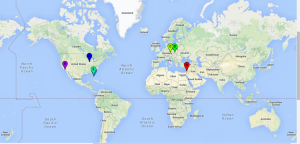Throughout this website, it is possible to find analyses of websites related to the Holocaust. In this section, we have analyzed university websites, and the ways in which the Holocaust and Jewish studies are presented in academic settings around the world. We have studied universities around the world as we thought this would help us have a broad understanding of the ways this topic is studied. We studied places of significance in relation to this subject: Israel, the United states, Poland, Prague, Germany, and England.

General Findings
We have found that many university websites dedicated to Jewish or Holocaust studies act as pseudo advertisements for their respective Jewish Studies programs, history departments, etc. While it is clear that those particular sites have uses and purposes other than advertisement, it is hard to shake the sense that the authors of the sites are also saying “and if you came to our school, you could learn all of this too!”
Additionally, it seems that every site we looked at treats the Holocaust in much the same way. There is an air of reverence and respect which permeates the language used in all of these university websites. There is also a sense among all of these websites that, while there is a need to memorialize and respect the victims and survivors, the Holocaust was a major historical event, and thus is looked at as a massive source of facts and information which is to be gained.
One question that begs an answer after looking at these websites is why is the Holocaust looked at more or less in the same lens in universities all over the world? In particular, why is it that in America, a nation which was not directly impacted by the Holocaust in the same way in which European nations and Israel were, the Holocaust is seen the same way as in those countries? There is much that can be said about how Americans place the Holocaust in incredibly high-standing, culturally. Or perhaps it is a facet of world-wide university culture, which is relatively similar and leads to similar thoughts on the same subject. This question remains largely unanswered, but it yields interesting thought processes.
What did they tell us about the Holocaust?
The websites that we found show the significance of the Holocaust. Not only in their content, but through the number of university programs which exist in order to educate those interested in higher level education on the subject. Some sites featured videos, and lectures that have been given on behalf of their university, other sites included photo galleries that showcased their university’s involvement in events, or excursion programs related to the subject, in order to personalize it’s program for viewers.
While many similarities existed in each of the pages analyzed, perhaps due to administration/ administrative purposes, the approach that some websites took, or the reasoning behind the programming may have varied. In all cases, there was a history that connected each university to the subject of Jewish studies, or Holocaust studies, and each university was able to link a faculty member, former faculty member, a family member of a faculty member, or their own country’s history to the Holocaust, or the significance of Jewish studies. Showing how large an impact the Holocaust had on the world.
What do they tell us about how people remember the Holocaust?
Because our focus was on websites through universities, our research found that we remember the Holocaust through education and on an academic level. Multiple programs are offered at the university level to study the Holocaust as a major, minor, or just to take classes or attend events on the Holocaust and research regarding it. One of our websites offered resources for teachers of the Holocaust for all grade levels, showing its presence in the education field.
Other aspects of memory focus on how a person’s research is presented. Some websites had interviews with victims and survivors, others had photographs and other media forms that are primary sources for the Holocaust. Multiple events are held throughout the year at various universities, whether its a presentation of research, a meeting of scholars of the Holocaust, or a viewing of a movie on the Holocaust. All of these contribute to preserving the memory of the Holocaust.
Method of Organization
We decided to split up our university research based on geography: Eastern and the Western United States, Europe, and Israel, to see if the geographical location would change how these universities view the Holocaust. We also wanted to see if there was any difference in programs between nations and the information given on them. On our website, we divided this into American Universities and International Universities.